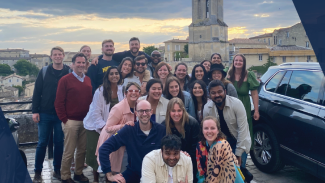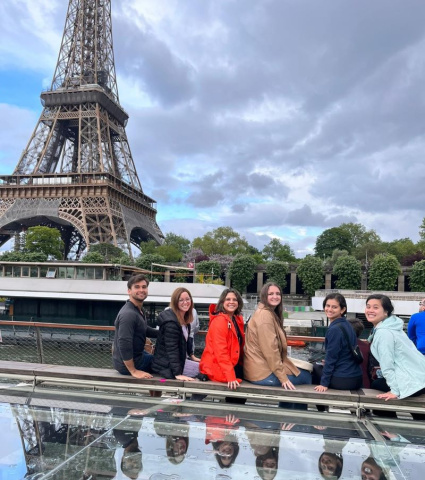Global Initiatives Course Compares Healthcare in the United States and France

In May 2023, Thomas Buchmueller, senior associate dean for faculty and research and professor of business economics and public policy, led a two-week course with Global Initiatives examining comparative health systems in France.
The Global Initiatives team at the Ross School of Business provides unique, impactful, and culturally immersive international business opportunities and experiences for undergraduate and graduate students.
Global Initiatives offers semester-long exchange programs as well as short-term global immersion courses led by Michigan Ross faculty. These short-term courses cover a range of topics and offer students a chance to learn firsthand from local experts. The faculty who lead the short-term programs have direct research, work, and/or life experience in the program’s host country.
Buchmueller has experience and expertise in the economics of health insurance, both in the United States and globally. He has previously lived in France and was a visiting professor at the University of Bordeaux.
His connections in-country allowed students to experience various company visits, presentations, cultural experiences, and lectures. The program brought together 26 students from various backgrounds and schools, including MBA students from Michigan Ross, health informatics and medicine students from the Michigan Medical School, public health and health management students from the U-M School of Public Health, and public policy students from the Ford School of Public Policy.

To prepare for their two-week residence in France, students engaged in asynchronous pre-work that covered a variety of healthcare-related topics. Some of the topics included: economic concepts of efficiency and equity in healthcare, typology of health systems, approaches to prescription drug approval and reimbursement, basic features and values of the French healthcare system, and the impacts of COVID-19 on the French healthcare system.
During the students’ time in Paris and Bordeaux, they heard from various start-up companies, a pharmaceutical company, the regional government in Bordeaux, and other healthcare experts. In Paris, students also enjoyed hearing from Doctolib, a popular digital health platform where patients can make appointments directly with physicians in their area. The platform connects patients with doctors and has become a primary scheduling resource in France. Company visits to Lifen and Sanofi also gave students different perspectives on digital health startups and pharmaceutical companies, respectively.
Other presentations included SimforHealth, a healthcare start-up where students were given a demonstration of their digital healthcare simulation technology, and Synapse Medicine, whose goal is to be the central resource for prescription information for physicians and potential drug usage monitoring.
As a result of these presentations, students identified some of the shared problems facing the U.S. and French healthcare systems, such as the physician shortage, the decline of general practice doctors, the lack of access to medical care for those who live in rural areas, and the lack of consistency in data integration between healthcare providers. However, while similar at first glance, solutions to these challenges would need to be contextualized and likely will look different for each country.

“It was fascinating to consider how even the seemingly minor differences between health policies among countries in the European Union had significant ripple effects on the business models of the startups we heard from, depending on where they sought to fit into the healthcare ecosystem,” said Brynna Thigpen, MPP/MBA '23.
At the conclusion of the program, students used learnings to enhance their ultimate assessment deliverable of a SWOT analysis (strengths, weaknesses, opportunities, and threats) of three start-up companies.
“It's important to experience startups in other cultures to truly understand what the needs of their citizens are in order to be internationally successful,” said Pooja Verma, MBA ’24.
Short-term immersion programs create a space for students to connect their previous experiences, learnings from Ross, and future interests with a global perspective.







